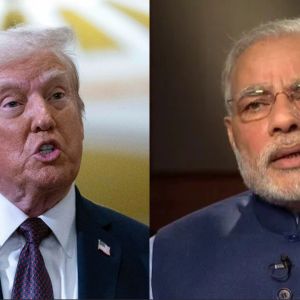India strikes first blow against Trump tariffs
3 min read
India officially told the World Trade Organization (WTO) that it plans to increase tariffs on goods made in the United States as a direct response to the Trump administration’s decision to impose high duties on steel and aluminum. This is India’s first trade retaliation against the U.S. during Donald Trump’s second term as president, even though both countries are still working to finalize a broader trade agreement that they hope to finalize in the coming months. India tells WTO it will raise tariffs to fight back against U.S. trade duties India submitted a detailed notification to WTO on Monday explaining how the U.S government’s decision to impose high duties on steel and aluminum has hurt the country’s trade. As a result, it plans to raise tariffs on various goods imported from the United States. Furthermore, India argued that the U.S. tariffs break global trade rules and that their excuse of “national security” to introduce these duties was more of “safeguard measures” or emergency trade restrictions countries can respond to under WTO regulations. The U.S. announced in March that the tariffs would add a 25% duty on all steel imports and similar levies on aluminum as part of President Trump’s efforts to change how the country trades with the world and improve national security. India has responded, claiming that the tariffs have affected $7.6 billion worth of its exports and will force U.S. importers to pay an extra $1.91 billion in duties on Indian goods , which makes the products more expensive but less competitive in the American market. India will raise tariffs on a similar amount of U.S. goods to make the total cost of duties equal on both sides as a countermeasure in line with WTO regulations that allow a country to suspend its trade promises when another nation’s actions cause unfair damage. India’s tough trade stance may strain ongoing U.S negotiations India avoided reacting strongly to Trump’s trade actions during most of his second term. New Delhi did not respond immediately, even after the U.S slapped heavy tariffs on Indian steel and aluminum exports earlier this year. Instead, it hoped that cooperation and diplomacy would lead to better results for both sides and, therefore, continued the talks to finalize a bilateral trade agreement. In addition, India lowered import duties on American goods like Harley-Davidson motorcycles and bourbon whiskey to help both countries move closer to a trade deal and because President Trump has personally criticized the country over these goods. The country didn’t stop there; it also overhauled its tariff system by cutting import duties on over 8,500 industrial products to reduce barriers and express its willingness to cooperate. However, the recent filing shows that India isn’t willing to wait for diplomacy alone to solve its trade issues and is now ready to stand up for its economic interests by taking strong steps within the rules of WTO. India’s decision to file a WTO notification while still in trade talks with the U.S. could make the negotiations difficult, and experts warn that this action might cast a shadow over the final stages of the deal. New Delhi previously offered to reduce two-thirds of its tariff gap with the U.S. to help close the distance between the two sides. Still, Washington took a tougher stance and recently threatened to slap a 26% torrid on Indian exports, which could escalate the tensions further if talks fall apart. President Trump also made comments that linked the trade between the U.S and India to Kashmir ceasefire negotiations between India and Pakistan, which made matters even more politically sensitive. “If you stop it, we’re doing trade. If you don’t stop it, we’re not going to do any trade.” Trump said. However, government sources who spoke anonymously claimed that trade negotiations had nothing to do with political or military matters and that India never used it as a bargaining chip in discussions with the U.S. This tension comes as India imposed a temporary 12% import duty on steel from countries like China to prevent a flood of cheap metal from hurting local producers as a way to protect its domestic industries while also using global trade regulations to assert itself intentionally. Cryptopolitan Academy: Want to grow your money in 2025? Learn how to do it with DeFi in our upcoming webclass. Save Your Spot

Source: Cryptopolitan



